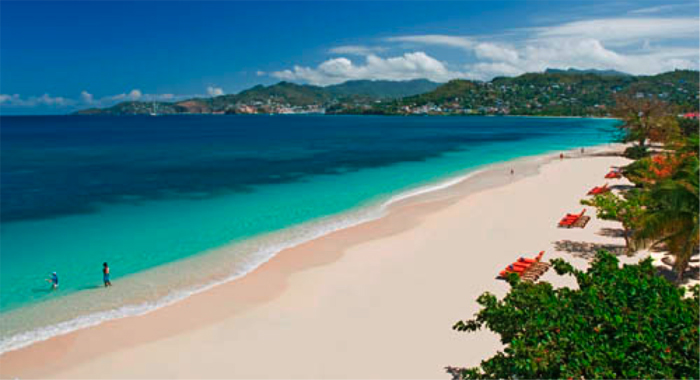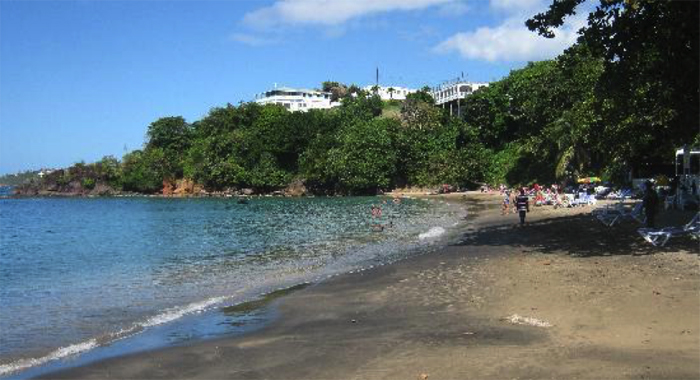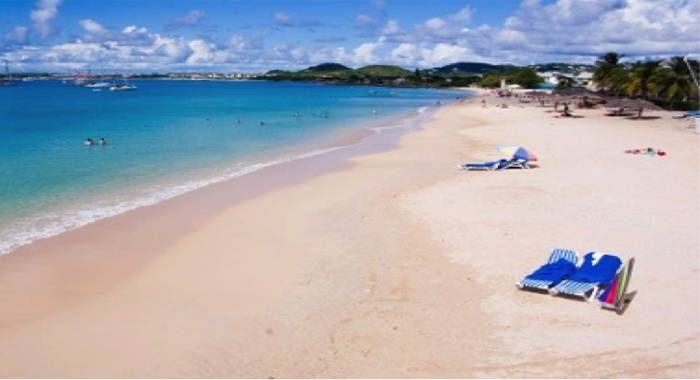By C. ben-David
There is no better evidence that Argyle International Airport (AIA) on the island of St. Vincent (SVI) will fail to meet its visitor expectations because there was no compelling reason, apart from electoral politics, for the airport’s construction than a side-by-side comparison of international tourism and allied features with our two geographically closest neighbours, St. Lucia and Grenada. This is because the three islands share so much in common, while differing in a couple of critical areas, exactly what is needed for good comparative analysis.
Being roughly at the same latitude and longitude and separated by a few miles of ocean, being similar in size and population density (see Table 1), having a shared history of sugar plantation slavery under British Crown colony rule, and now possessing nearly identical systems of independent governance and a relatively free market economy, it would be hard to find three islands more suitable for comparison.
Table 1. A key indicators comparison of St. Lucia, Grenada, and St. Vincent Island
| St. Lucia | Grenada | St. Vincent Island | |
| Population size | 185,000 | 111,000 | 104,500 |
| Area | 617 sq km | 344 sq km | 344 sq km |
| Population density | 300 per sq km | 323 per sq km | 304 per sq km |
| Geology | volcanic island | volcanic island | volcanic island |
| Terrain | gently rolling; mountainous | hilly; mountainous | hilly; mountainous |
| Climate | tropical | tropical | tropical |
| History | Slavery-based sugar-cane society | Slavery-based sugar-cane society | Slavery-based sugar-cane society |
| Natural white sand beaches | 20+ | 35+ | 2 mixed coral-volcanic rock |
| Total visitors (2015) | 1,088,181 | 444,391 | 157,460 |
| International airport | 1973 | 1984 | 2017 |
| Regularly-scheduled overseas flights | 31 per week | 21 per week | In progress |
| Extra-Caribbean stayover air visitors | 282,163 | 115,865 | 53,815 |
| Guest bedrooms | 5,000* | 1,500 | 750 |
| Cruise ship calls | 387 | 201 | 51 |
| Cruise ship passengers | 677,394 | 280,518 | 82,079 |
| Landed cruise passengers | 115,157** | 47,688** | 13,953** |
| Yacht passengers | 56,799 | 22,115 | 6,358 |
| Total visitor expenditure (EC$ M) | 1,071.73 | 392.50 | 258.51*** |
| Per capita GDP | $EC 27,500 | $EC 22,500 | $EC 18,700 |
| Unemployment rate | 25 percent | 28.9 percent | 18.8 percent |
| Direct GDP tourism contribution | 14.5 percent | 7.5 percent | 5.4 percent*** |
*Estimate from earlier years.
**Based on the same 17 percent landed cruise ship passengers as Barbados (see essay number 41 below).
***Includes the Grenadines.
Source: Eastern Caribbean Central Bank, country, and other reports.
Unlike our own AIA, built mainly by selling precious Crown land and borrowing EC$400 million from external sources, St. Lucia’s Hewanorra International Airport was largely financed on the back of a military airport built by the United States in 1941 to protect the island from German attack during World War II. The airport was handed over to St. Lucia in 1952, basically as a gift to the island. It became fully operational with a new control tower in the early 1970s, but did not see serious internationally scheduled flights until 10 years later when St. Lucia already had over 2,000 hotel rooms, or nearly three times our 750 room total, based on decades of increases in tourist traffic to the regional airport outside the capital of Castries (http://sundominica.com/articles/continuing-the-conversation-on-the-international-a-1750/ ).
Grenada’s Maurice Bishop International Airport, opened in 1984, received nearly all its funding from outside, first from the Cubans and then from the Americans who completed the airport after the country was liberated from its unelected and totalitarian communist regime. As in St. Lucia, it took some 10 years to see regularly scheduled international flights by which time Grenada already had over 1,000 hotel rooms, or 130 per cent above our 750-room mainland count.
In short, in both islands, visitor and accommodation increases grew hand in hand for decades despite the alleged “inconvenience” of the existing regional air transport system. The two international airports were built only to accommodate the growing volume of tourists drawn there by the quality and variety of their many attractions.
The lesson to be learned from this is the same one I have been relentlessly preaching for over two years: airports are built, enlarged, or renovated to address an actual or reasonably expected rise in the supply of passengers, not the reverse.

What then accounts for the large disparity in stopover tourist visitors between SVI and our two close neighbours? It cannot be the features in Table 1 we all share like climate, geology, topography, size, population density, or history; it cannot be because St. Lucia and Grenada have so many more hotel and other rooms than we do — these were built in response to past increases and reasonable prospects for future gains; it cannot be the many more attractions listed in Table 2 below because many of these were developed to complement the needs of the growing number of visitors who went there mainly for something else; its cannot be the stark differences in wealth represented by the per capita Gross Domestic Product figures because these are a result of mass tourism, not their cause; it cannot be the levels of unemployment because these are poorly correlated with visitor numbers; and it cannot be the presence of their international airports because they were built to accommodate steady increases in overseas guests.

Nevertheless, the answer to the question of what accounts for the huge disparity in stopover and other tourist visitors between these two islands and SVI also lies in Table 1 and is St. Lucia and Grenada’s many white sand beaches and other desirable attractions. (The stark tourist number differences between St. Lucia and Grenada reflect the finer beaches and larger number and variety of desirable supporting attractions on St. Lucia.)
These assertions are supported by Tripadvisor, the world’s largest travel site with more than 60 million members and over 170 million reviews and opinions of hotels, restaurants, attractions and other travel-related businesses, which lists the following “things to do” for these three islands (Table 2).
Table 2. “Things to do” according to tripadvisor
| St. Lucia | Grenada | St. Vincent Island | |
| Tours | 167 | 66 | 8 |
| Outdoor activities | 156 | 61 | 15 |
| Nature & parks | 81 | 43 | 25 |
| Boat tours & water sports | 80 | 38 | 4 |
| Sights & landmarks | 30 | 28 | 14 |
| Shopping | 34 | 12 | 2 |
| Spas & wellness | 18 | 9 | 0 |
| TOTAL | 566 | 257 | 68 |
Both the key tourism related physical differences between the islands — facts of nature over which we have no control — and the way they have been developed, augmented, and promoted is also why proportionately more of our wealthy citizens have always travelled on holiday to our two neighbours than their citizens have travelled here to enjoy our mainland.
Given what I have repeatedly argued about our limited mainland tourism potential, an observation no better verified than by our stagnant or declining tourist numbers over the past 16 years in the three categories of stopovers, cruisers, and yachters (see essay number 49), why did we build an international airport on an island with one bogus white sand beach on a tiny stretch of Buccament Bay whose large resort (nearly 15 per cent of our mainland hotel capacity) is now shuttered, probably for good?
Ask Ralph.
This is the 53rd in a series of essays on the AIA folly. My other AIA essays are listed below:
-
- Get ready for a November election!
- Lessons for Argyle Airport from Canada’s Montreal–Mirabel Int’l
- Lessons for Argyle Int’l Airport from the cruise industry
- Lessons from Target Canada for Argyle Int’l Airport
- Lessons from Trinidad & Tobago for Argyle Int’l Airport
- The Dark Side of Tourism: Lessons for Argyle Airport
- Why Argyle Won’t Fly: Lessons from Dominica
- Ken Boyea and the Phantom City at Arnos Vale
- Airport Envy Vincy-Style
- Fully realising our country’s tourism potential
- Airport without a cause
- The unnatural place for an international airport
- The Potemkin Folly at Argyle
- False patriotism and deceitful promises at Argyle
- Airport politics and betrayal Vincy-Style
- Phony airport completion election promises, Vincy-style
- Is Argyle Airport really a ‘huge game-changer for us?’
- Has the cat got your tongue, Prime Minister?
- More proof that Argyle won’t fly
- Our very own Vincentian cargo cult at Argyle
- The missing Argyle Airport feasibility studies
- The world’s four most amazing abandoned airports
- Farming, fishing, and foolish talk about Argyle International Airport
- Argyle Airport amateur hour
- Vincent’s place in the world of travel
- Investing in St. Vincent’s Tourism Industry
- The Argyle Airport prophecy: what the numbers say
- Why Qatar? Why St. Vincent and the Grenadines?
- Did the IMF drink the Comrade’s Kool-Aid?
- Foolish words about Argyle International Airport
- ‘If I come, you will build it’: Lessons from the Maldives for Argyle Airport
- Urban lessons for Argyle International Airport
- Who really lands at Arnos Vale?
- No ticky, No washy — Argyle-Style
- We have met the Vincentian tourism enemy and he is us
- Hotel Saint Vincent
- Why St. Vincent Island has so few tourists
- Why Bequia is a gem of the Antilles
- Why seeing is believing in the Caribbean tourism industry
- St. Vincent’s cruise ship numbers are much lower than we think
- Lessons from Barbados for Argyle Airport
- Cuba’s tourism rollercoaster: Lessons for Argyle Airport
- What the world teaches Black Sands Resort and Villas
- Not all Argyle Airport critics are ‘internet crazies’
- The media’s take on the opening of Argyle Airport
- Why Roraima Airways? Lessons for Argyle Airport
- Our Argyle International Airport ‘veritable miracle’
- From ‘poppy show’ to campaign rally: The Argyle Airport opening
- St. Vincent’s 2016 tourism numbers are nothing to brag about
- Going forward or marching in place? Lessons for Argyle airport
- The Visible Hand of Adam Smith at Argyle International Airport
- St. Vincent Island doesn’t need any more hotel rooms
The views expressed herein are those of the writer and do not necessarily represent the opinions or editorial position of iWitness News. Opinion pieces can be submitted to [email protected]
The opinions presented in this content belong to the author and may not necessarily reflect the perspectives or editorial stance of iWitness News. Opinion pieces can be submitted to [email protected].






